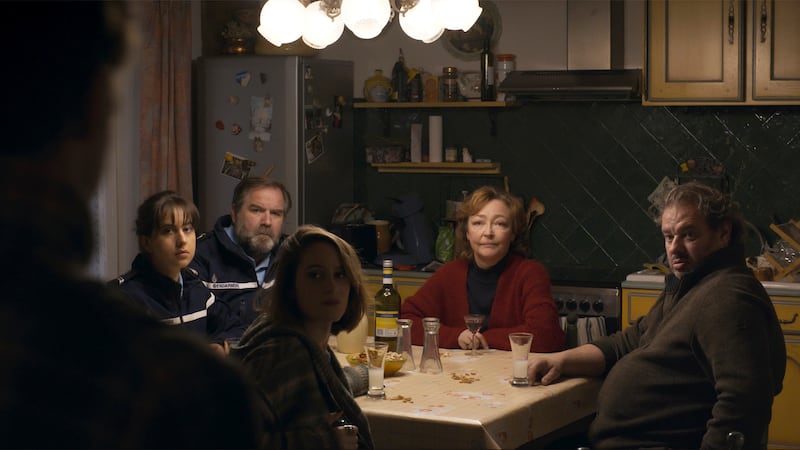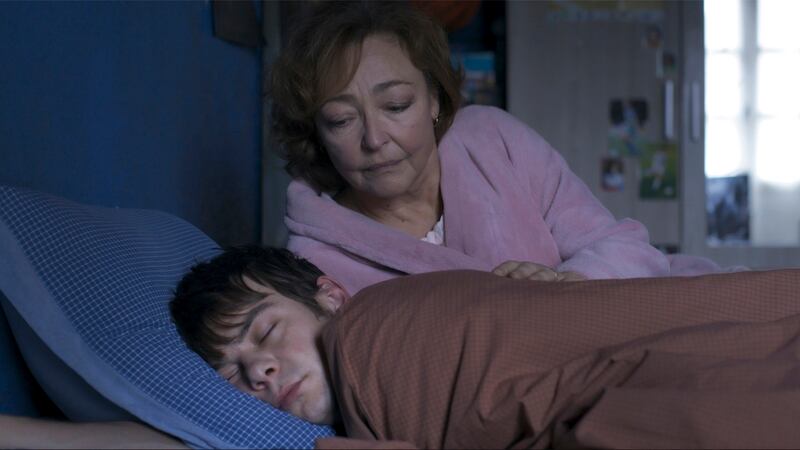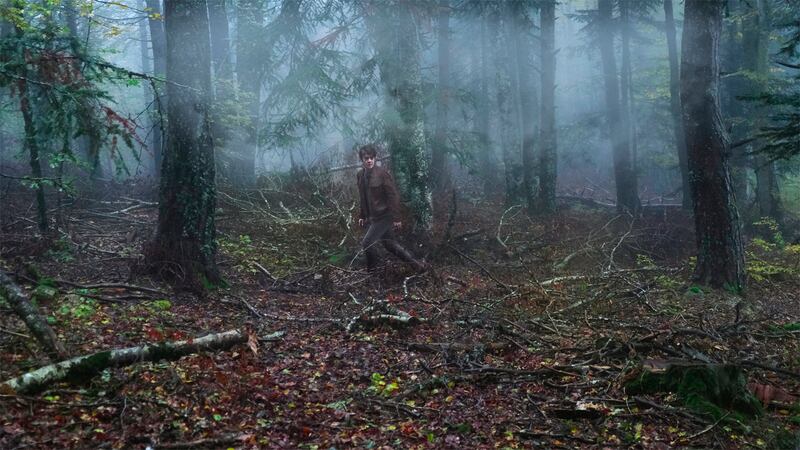Morality and desire collide in Misericordia, an entrancing neo-noir that upends conventions at every surprising turn.
French director Alain Guiraudie (Stranger by the Lake) is in excellent form with his newest tale of sex and murder, which hits theaters Mar. 21. This time, the focus is on a young man who finds himself ensnared in a homicidal web of his own making. Alternately warm and chilly, funny and tense, it’s a superb thriller that employs common genre devices for a canny and caustic rumination on right and wrong, love and lust, virtue and vice.
Misericordia’s easygoing forward momentum is established by opening shots out the windshield of a car driven by Jérémie (Félix Kysyl), who after a drive along winding country roads arrives at his destination: the small-town home of Martine (Catherine Frot), whose baker husband Jean-Pierre (Serge Richard) was Jérémie’s former boss and has now passed away.
Jérémie is welcomed with open arms by Martine, who allows him to stay the night. Following the funeral, she shows him a photo album that includes a picture of a shirtless Jean-Pierre emerging from the ocean, and Jérémie’s attraction to the image—later, he returns to the album and asks Martine if she has the negative so he can make a copy for himself—suggests that he felt more than just professional admiration for the man.
Though Martine is initially pleased to have Jérémie around, her son Vincent (Jean-Baptiste Durand) is not. Married to wife Annie (Tatiana Spivakova), with whom he has a phone-fixated son named Kilian (Elio Lunetta), Vincent bristles at Jérémie staying in his childhood bedroom, which hasn’t been altered since his departure.
The next morning, he bumps into Jérémie in the forest—where everyone casually forages for mushrooms—and instigates a wrestling match that’s only playful on the surface. Vincent clearly dislikes Jérémie, and not simply because Jérémie has visited Vincent’s best friend Walter (David Ayala), a portly single farmer with a head of disheveled hair.

Even so, Jérémie opts to stay a few days with Martine, informally wondering whether he should take over Jean-Pierre’s closed bakery. That really irks Vincent, who’s soon materializing at Jérémie’s bedside in the early morning and accusing him—with an unfriendly shove to the chest—of wanting to sleep with his mother.
Jérémie doesn’t appear to covet Martine, but he remains inscrutable throughout Misericordia, his face a mask that expresses just enough to make him seem ordinary while concealing his true thoughts and feelings.
A second confrontation between Jérémie and Vincent in the woods involves outright accusations and devolves into a more hostile skirmish. That night, Martine gives Jérémie some of her deceased husband’s clothes to wear, and at dawn, Jérémie gets the jump on Vincent in his car, telling him, “I can take you down anytime.”
The two are destined for a showdown, and their simmering antagonism is nicely contrasted with the film’s setting, be it the quiet streets of this quaint enclave or the lush forest and its canopy of autumnal leaves, the latter of which is often frequented by local priest Philippe (Jacques Develay), who’s friends with Martine and whose eyes indicate that he has a particular interest in Jérémie.

Misericordia’s action is intermittently scored to a low, droning rumble that portends disaster. Yet before calamity strikes, Jérémie calls on Walter for a drink and, after hiding from Vincent—whom they both know would be unhappy about their get-together—dons Walter’s clothes and tries to come onto him.
For his trouble, he’s tossed out of the house and shot at by an angered Walter, and during his walk home, Jérémie is picked up by Vincent. Their ensuing fight ends with Jérémie bludgeoning Vincent to death in the forest and spending the rest of the night interring him in a remote patch. When he arrives back at Martine’s, she’s angry that he didn’t call. However, her real concern quickly becomes the whereabouts of Vincent, whom no one thinks would abandon his clan, especially in the immediate wake of his father’s passing, and regardless of the fact that his car was located at a train station and he has a reputation as a hothead.
Jérémie hides his misdeed semi-gracefully, and he eventually attracts the suspicions of not simply Martine and Annie but two local police officers who parse the logistics of his (ever-changing) story. Misericordia proceeds placidly, its rhythm consistently measured, and that even-keeled tempo helps create a sense of barely suppressed suspense—a mood echoed by the protagonist’s reserved countenance.
Jérémie doesn’t feel enough remorse to turn himself in, and his attempts at avoiding capture are complicated when he’s asked by Philippe to hear his confession. At that point, Guiraudie’s film mutates into something unique, lacing its familiar genre maneuvers with spiky strains of passion and longing, as well as pointed questions about crime and punishment.
Through Jérémie and Philippe’s unexpected bond, Guiraudie ponders whether murder is a sin worth punishing, whether desire trumps decency, and whether internal suffering is a price worth paying for freedom. Such notions are raised without being resolved, with the writer/director tackling his prime issues via Jérémie’s increasingly difficult efforts to convince Martine and the cops—including a burly officer who repeatedly breaks into his bedroom in the hope that he’ll confess in his sleep—that he had nothing to do with Vincent’s disappearance.
As it wends its way toward a conclusion that’s anything but conclusive, Misericordia proves a novel spin on a familiar formula, its strange psychosexual undercurrents lending it a decidedly Hitchcockian mania.

For those familiar with the auteur’s work, Misericordia will resonate as a slightly more accessible revisitation of his favorite themes. Yet that hardly marks it as a rehash. Its tranquility the key to its tautness, the film casts an alluring spell which it maintains up to a final note that’s amusingly bleak and callous.
Like the forest whose trails he routinely walks, Jérémie has a calm and collected exterior beneath which is buried dark and nasty secrets, and Guiraudie doesn’t judge so much as gaze at him with fascination, fear, and bemusement—an off-kilter mixture that infuses his latest with its memorably macabre spirit.









